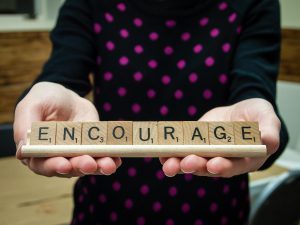I will never forget the time I was at a Labor Day party, checking on my kids, who were 4 and 2 at the time, and someone at the party made a helicopter noise with their mouth. I stopped and looked at him, and said: “I just want to make sure they don’t get hurt.” I thought about it the whole way home, and well, still to this day. Am I a helicopter mom? Is it really a bad thing?

I was the only parent there who checked on their kids, the others never got up. So, I decided to do some research on the meaning of helicopter parenting and its consequences. There are many reasons that parents hover over their kids, whether to make sure they succeed, don’t get hurt physically or emotionally, or to overcompensate on the love they did not receive as a kid.
As parents, no one wants to see their kids get hurt, and we all want them to succeed. However, there has to be a balance. After reading some of the future consequences on kids from parents who hover, I decided to scale back. Do not get me wrong, I still like to be completely involved in their lives, but I have learned to allow them to gain experience and play with others on their own without stepping in (too much). It is not easy at all, because I want to protect them in every way possible, but I have to allow them to succeed, fail, and learn from it. I have to provide that balance for the sake of their psyche and growth.
The Different Studies
Studies were performed on kids of all age groups, from children and teenagers, to college students relating their mental health and behavior to the type of parents they had. Kids were brought into a room with their parents and were given a puzzle to complete. The parents were not told to help their child. The study revealed that the parents of children with social anxiety touched the puzzles more often than other parents, even when their kids did not seek help.
Another study conducted in 2010 by researcher Neil Montgomery, a psychologist at Keene State College in New Hampshire, showed that college students who have overprotective parents exhibited childlike and adolescent behavior. About 300 college freshmen were surveyed about their parent’s involvement in their lives. Of the ones who had helicopter parents, they tended to be less open to new ideas, were more vulnerable, self-conscious, and dependent.
The study that probably hit me the hardest in easing up on my kids was the one conducted in 2016 from the National University of Singapore. It indicated that children with parents who had high expectations of their kids were anxious and depressed. The kids blame themselves for not being perfect, due to the parent’s actions or words indicating that what they do is never good enough. That was my parents when I was growing up, and the feelings of anxiety followed me into adulthood.
The Long-Term Consequences
Helicopter parenting is not a bad thing if done in moderation. But if you overdo it, kids will suffer in the long run. Multiple studies have shown that the major future consequences on kids with helicopter parents are:
- Underdeveloped Brain– The more parents problem solve for their children, the less likely the child’s brain will be able to develop in the critical thinking and problem-solving area. The brain will not have exercised enough.
- Low-Self Esteem– Constantly fixing things for your kids, and not allowing them to learn for themselves

Studies show that children who grew up with helicopter parents dealt with depression. underdevloped brains, low self-esteem, and other negative effects. leaves them with little confidence to succeed on their own. When a parent hovers around their kid doing things for them, it creates feelings of codependency, like they are not smart or good enough on their own.
- Inability To Cope– When a parent cleans up after their kid, solves their problems for them, or prevents aproblem altogether, it is a mistake itself. Why? Well, the child will never develop inherent ways to cope with stress.
- Depression– A child’s depression and anxiety increase with a helicopter parent. The child is always seeking guidance because they have not built self-confidence. They become nervous when making a decision on their own.
- Sense of Entitlement– Kids who are given everything by their parents, or have everything done for them, develop a sense of entitlement. They become demanding and feel like they have a right to get what they want. (Who wants to deal with that?! Not me!)
Finding A Balance
Parenting is not easy. Every parent knows this because raising children does not come with a manual (although I wish it did!), and we just want them to succeed in everything they do. But it is not realistic. They will struggle, fail, break a bone (hopefully not), and they will get rejected. And that is okay! As parents, we need to give them tools so that when they fail, they know how to pick themselves back up, shake it off, and carry on, to be confident enough to love themselves, remain positive, happy, and to learn from their mistakes.
So how can we find a balance between helping our kids, and not hovering/taking over? Well, it’s a struggle on both sides. But it is allowing them to do tasks that they are physically and mentally capable of doing, with some direction from you. Here are some approaches you can take:
- When your kid is struggling with homework, allow them to solve it on their own. I know this is hard to do. It is for me at least. I just want to help my daughter find the solution quickly, but it is not okay. They have to try to come up with it on their own and learn to problem solve. Encourage them to solve it with creative solutions, and help guide them. But never just do it for them.
- Listen to your kids and what they are saying, Allow them to be themselves and grow without pushing your desires on them.
- Allow your child to face consequences for their actions. We want to protect our kids, but letting them deal with the consequences of their actions and words will teach them not to do the action again. Unless it is life altering or unfair, allow it to happen.
- Teach your child to speak up for themselves and defend themselves, as long as it is done in a respectful manner. There will be bullies in their life and kids bossing them around. As much as we want to be the ones to go to school, or those kid’s parents, we must allow them to stand up for themselves.
- All kids will have strengths and weaknesses. Learn to accept all of it, and help them use their strengths to succeed.
- Do not raise your kid to expect special treatment. Our kids are special to us, but they are not great at everything they do. For example, in sports, parents will fight with the coach to put make their kid the star and get special treatment. This is not okay, if your kid wants to be better in the sport then this is not the way to go about it. Teach them to work harder and practice more to achieve the position they want.

Instead of hovering over your kids, and doing things for them, simply encourage them to make their own mistakes and learn from them. Encourage them to be their own person, and to colve a problem using their strengths. - In order to foster self-confidence in your child, praise them accordingly. When you praise your child try saying “You must have worked hard on that, good job.” Instead of saying “That’s so good, you’re so talented.” It promotes self-confidence that they worked hard on something, rather than it is a talent that comes effortlessly. Teaches them to work hard for success, and appreciate more.
The consequences that followed the kids into adulthood were extremely upsetting to me. It opened up my eyes. Not only was I hovering, but I directed them on how to do stuff, and eventually took over and just did it myself. I would tell them what to say, how to act, how to interact with other kids, and I would make sure they were not bullied when playing. If they got hurt I would run to them right away to comfort them. I do not want my children to be anxious, depressed, and unable to cope with all the stress and problems that come with life. I want my kids to be happy and able to conquer anything. So, I learned to back off a little, and let them play with their friends outside. As much as it pains me, I let them get hurt, struggle, and learn from it. And I let them stand up for themselves, but also make sure I am there to be their net when they fall to comfort them.
As parents, we have a sense of duty to jump into our kid’s lives and what they’re doing. But we have to dial it back and let them discover who they are, their strengths, weaknesses, and who they want to be. Once they fail and learn from it, they will become stronger, smarter, and more independent. The ultimate goal of parenting is to raise kind, smart, and independent people. This can only be done with some dirt under their nails, and a whole lot of love and support behind them.